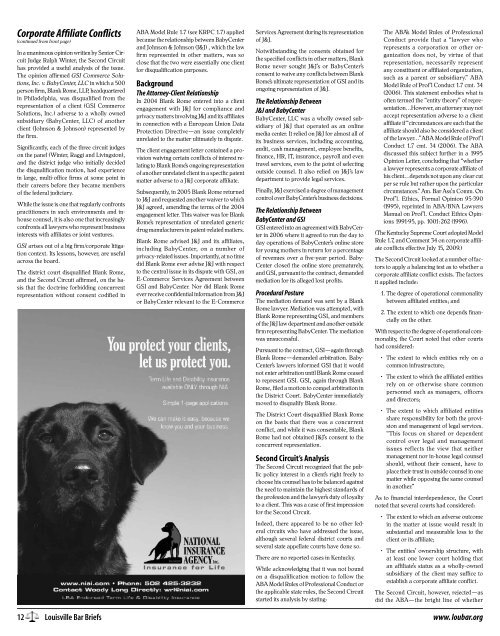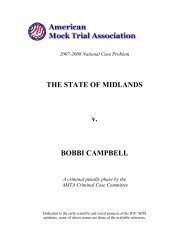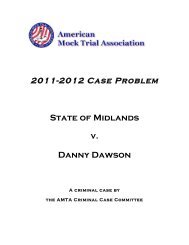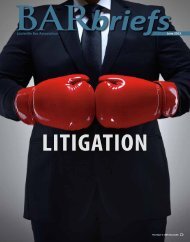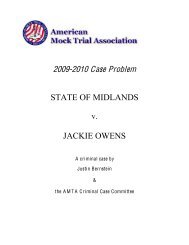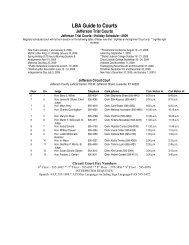Corporate Affiliate Conflicts of Interest - Louisville Bar Association
Corporate Affiliate Conflicts of Interest - Louisville Bar Association
Corporate Affiliate Conflicts of Interest - Louisville Bar Association
Create successful ePaper yourself
Turn your PDF publications into a flip-book with our unique Google optimized e-Paper software.
<strong>Corporate</strong> <strong>Affiliate</strong> <strong>Conflicts</strong><br />
(continued from front page)<br />
In a unanimous opinion written by Senior Circuit<br />
Judge Ralph Winter, the Second Circuit<br />
has provided a useful analysis <strong>of</strong> the issue.<br />
The opinion affirmed GSI Commerce Solutions,<br />
Inc. v. BabyCenter, LLC in which a 500<br />
person firm, Blank Rome, LLP, headquartered<br />
in Philadelphia, was disqualified from the<br />
representation <strong>of</strong> a client (GSI Commerce<br />
Solutions, Inc.) adverse to a wholly owned<br />
subsidiary (BabyCenter, LLC) <strong>of</strong> another<br />
client (Johnson & Johnson) represented by<br />
the firm.<br />
Significantly, each <strong>of</strong> the three circuit judges<br />
on the panel (Winter, Raggi and Livingston),<br />
and the district judge who initially decided<br />
the disqualification motion, had experience<br />
in large, multi-<strong>of</strong>fice firms at some point in<br />
their careers before they became members<br />
<strong>of</strong> the federal judiciary.<br />
While the issue is one that regularly confronts<br />
practitioners in such environments and inhouse<br />
counsel, it is also one that increasingly<br />
confronts all lawyers who represent business<br />
interests with affiliates or joint ventures.<br />
GSI arises out <strong>of</strong> a big firm/corporate litigation<br />
context. Its lessons, however, are useful<br />
across the board.<br />
The district court disqualified Blank Rome,<br />
and the Second Circuit affirmed, on the basis<br />
that the doctrine forbidding concurrent<br />
representation without consent codified in<br />
ABA Model Rule 1.7 (see KRPC 1.7) applied<br />
because the relationship between BabyCenter<br />
and Johnson & Johnson (J&J) , which the law<br />
firm represented in other matters, was so<br />
close that the two were essentially one client<br />
for disqualification purposes.<br />
Background<br />
The Attorney-Client Relationship<br />
In 2004 Blank Rome entered into a client<br />
engagement with J&J for compliance and<br />
privacy matters involving J&J and its affiliates<br />
in connection with a European Union Data<br />
Protection Directive—an issue completely<br />
unrelated to the matter ultimately in dispute.<br />
The client engagement letter contained a provision<br />
waiving certain conflicts <strong>of</strong> interest relating<br />
to Blank Rome’s ongoing representation<br />
<strong>of</strong> another unrelated client in a specific patent<br />
matter adverse to a J&J corporate affiliate.<br />
Subsequently, in 2005 Blank Rome returned<br />
to J&J and requested another waiver to which<br />
J&J agreed, amending the terms <strong>of</strong> the 2004<br />
engagement letter. This waiver was for Blank<br />
Rome’s representation <strong>of</strong> unrelated generic<br />
drug manufacturers in patent-related matters.<br />
Blank Rome advised J&J and its affiliates,<br />
including BabyCenter, on a number <strong>of</strong><br />
privacy-related issues. Importantly, at no time<br />
did Blank Rome ever advise J&J with respect<br />
to the central issue in its dispute with GSI, an<br />
E-Commerce Services Agreement between<br />
GSI and BabyCenter. Nor did Blank Rome<br />
ever receive confidential information from J&J<br />
or BabyCenter relevant to the E-Commerce<br />
Services Agreement during its representation<br />
<strong>of</strong> J&J.<br />
Notwithstanding the consents obtained for<br />
the specified conflicts in other matters, Blank<br />
Rome never sought J&J’s or BabyCenter’s<br />
consent to waive any conflicts between Blank<br />
Rome’s ultimate representation <strong>of</strong> GSI and its<br />
ongoing representation <strong>of</strong> J&J.<br />
The Relationship Between<br />
J&J and BabyCenter<br />
BabyCenter, LLC was a wholly owned subsidiary<br />
<strong>of</strong> J&J that operated as an online<br />
media center. It relied on J&J for almost all <strong>of</strong><br />
its business services, including accounting,<br />
audit, cash management, employee benefits,<br />
finance, HR, IT, insurance, payroll and even<br />
travel services, even to the point <strong>of</strong> selecting<br />
outside counsel. It also relied on J&J’s law<br />
department to provide legal services.<br />
Finally, J&J exercised a degree <strong>of</strong> management<br />
control over BabyCenter’s business decisions.<br />
The Relationship Between<br />
BabyCenter and GSI<br />
GSI entered into an agreement with BabyCenter<br />
in 2006 where it agreed to run the day to<br />
day operations <strong>of</strong> BabyCenter’s online store<br />
for young mothers in return for a percentage<br />
<strong>of</strong> revenues over a five-year period. Baby-<br />
Center closed the online store prematurely,<br />
and GSI, pursuant to the contract, demanded<br />
mediation for its alleged lost pr<strong>of</strong>its.<br />
Procedural Posture<br />
The mediation demand was sent by a Blank<br />
Rome lawyer. Mediation was attempted, with<br />
Blank Rome representing GSI, and members<br />
<strong>of</strong> the J&J law department and another outside<br />
firm representing BabyCenter. The mediation<br />
was unsuccessful.<br />
Pursuant to the contract, GSI—again through<br />
Blank Rome—demanded arbitration. Baby-<br />
Center’s lawyers informed GSI that it would<br />
not enter arbitration until Blank Rome ceased<br />
to represent GSI. GSI, again through Blank<br />
Rome, filed a motion to compel arbitration in<br />
the District Court. BabyCenter immediately<br />
moved to disqualify Blank Rome.<br />
The District Court disqualified Blank Rome<br />
on the basis that there was a concurrent<br />
conflict, and while it was consentable, Blank<br />
Rome had not obtained J&J’s consent to the<br />
concurrent representation.<br />
Second Circuit’s Analysis<br />
The Second Circuit recognized that the public<br />
policy interest in a client’s right freely to<br />
choose his counsel has to be balanced against<br />
the need to maintain the highest standards <strong>of</strong><br />
the pr<strong>of</strong>ession and the lawyer’s duty <strong>of</strong> loyalty<br />
to a client. This was a case <strong>of</strong> first impression<br />
for the Second Circuit.<br />
Indeed, there appeared to be no other federal<br />
circuits who have addressed the issue,<br />
although several federal district courts and<br />
several state appellate courts have done so.<br />
There are no reported cases in Kentucky.<br />
While acknowledging that it was not bound<br />
on a disqualification motion to follow the<br />
ABA Model Rules <strong>of</strong> Pr<strong>of</strong>essional Conduct or<br />
the applicable state rules, the Second Circuit<br />
started its analysis by stating:<br />
The ABA’s Model Rules <strong>of</strong> Pr<strong>of</strong>essional<br />
Conduct provide that a “lawyer who<br />
represents a corporation or other organization<br />
does not, by virtue <strong>of</strong> that<br />
representation, necessarily represent<br />
any constituent or affiliated organization,<br />
such as a parent or subsidiary.” ABA<br />
Model Rule <strong>of</strong> Pr<strong>of</strong>’l Conduct 1.7 cmt. 34<br />
(2006). This statement embodies what is<br />
<strong>of</strong>ten termed the “entity theory” <strong>of</strong> representation…However,<br />
an attorney may not<br />
accept representation adverse to a client<br />
affiliate if “circumstances are such that the<br />
affiliate should also be considered a client<br />
<strong>of</strong> the lawyer…”ABA Model Rule <strong>of</strong> Pr<strong>of</strong>’l<br />
Conduct 1.7 cmt. 34 (2006). The ABA<br />
discussed this subject further in a 1995<br />
Opinion Letter, concluding that “whether<br />
a lawyer represents a corporate affiliate <strong>of</strong><br />
his client…depends not upon any clear cut<br />
per se rule but rather upon the particular<br />
circumstances.” Am. <strong>Bar</strong> Ass’n Comm. On<br />
Pr<strong>of</strong>’l. Ethics, Formal Opinion 95-390<br />
(1995), reprinted in ABA/BNA Lawyers<br />
Manual on Pr<strong>of</strong>’l. Conduct Ethics Opinions<br />
1991-95, pp. 1001:262 (1996).<br />
(The Kentucky Supreme Court adopted Model<br />
Rule 1.7, and Comment 34 on corporate affiliate<br />
conflicts effective July 15, 2009.)<br />
The Second Circuit looked at a number <strong>of</strong> factors<br />
to apply a balancing test as to whether a<br />
corporate affiliate conflict exists. The factors<br />
it applied include:<br />
1. The degree <strong>of</strong> operational commonality<br />
between affiliated entities; and<br />
2. The extent to which one depends financially<br />
on the other.<br />
With respect to the degree <strong>of</strong> operational commonality,<br />
the Court noted that other courts<br />
had considered:<br />
• The extent to which entities rely on a<br />
common infrastructure;<br />
• The extent to which the affiliated entities<br />
rely on or otherwise share common<br />
personnel such as managers, <strong>of</strong>ficers<br />
and directors;<br />
• The extent to which affiliated entities<br />
share responsibility for both the provision<br />
and management <strong>of</strong> legal services.<br />
“This focus on shared or dependent<br />
control over legal and management<br />
issues reflects the view that neither<br />
management nor in-house legal counsel<br />
should, without their consent, have to<br />
place their trust in outside counsel in one<br />
matter while opposing the same counsel<br />
in another.”<br />
As to financial interdependence, the Court<br />
noted that several courts had considered:<br />
• The extent to which an adverse outcome<br />
in the matter at issue would result in<br />
substantial and measurable loss to the<br />
client or its affiliate;<br />
• The entities’ ownership structure, with<br />
at least one lower court holding that<br />
an affiliate’s status as a wholly-owned<br />
subsidiary <strong>of</strong> the client may suffice to<br />
establish a corporate affiliate conflict.<br />
The Second Circuit, however, rejected—as<br />
did the ABA—the bright line <strong>of</strong> whether<br />
12 <strong>Louisville</strong> <strong>Bar</strong> Briefs<br />
www. loubar.org


